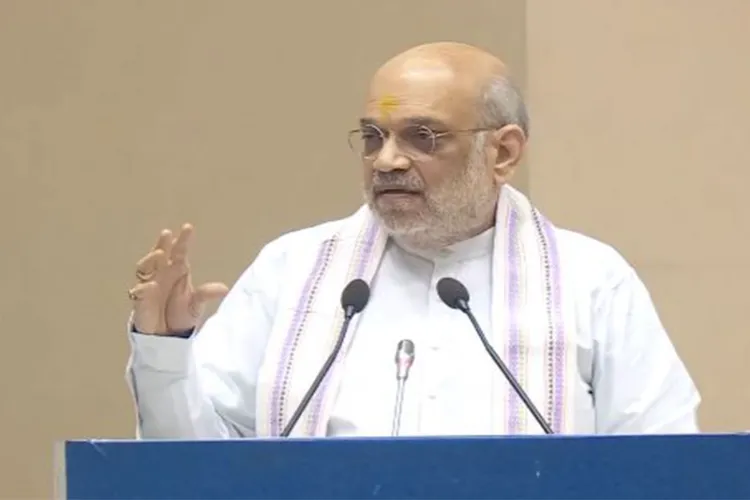
New Delhi
Union Home Minister Amit Shah on Sunday said India's battle against Naxalism cannot be won through armed operations alone, stressing the need to tackle the ideology behind the movement.
Speaking at the valedictory session of Bharat Manthan 2025 titled 'NAXAL MUKT BHARAT: Ending Red Terror Under Modi's Leadership' in New Delhi, Shah reiterated the government's goal of making India free of Naxalism by March 31, 2026.
"This country will be free of Naxalism by March 31, 2026. Many people believe that the Naxalite problem will end with the end of armed activities. But this is not the case. Why did the Naxalite problem arise, grow, and develop in this country? Who provided its ideological support? Until Indian society understands this theory, this idea of Naxalism, and the people in society who provided ideological support, legal support, and financial support, the fight against Naxalism will not end," he said.
"We can make Naxalits surrender or our security forces can neutralise them, but on the ideological front, we have to make a lot of efforts. Regarding this, the discussion that took place here is relevant and important to me as well," he added.
Shah further said,"...these leftists who stand in defence of Naxalites and say that they are our people and why should they be killed? We don't want to kill them. Two hundred ninety were killed because they were armed. We arrested 1,090. Where arrests were possible, we arrested them. 881 surrendered. This shows the government's approach."
"The government's approach is that we make every effort to arrest Naxalites and get them to surrender. We also give them a chance. We have also introduced a good surrender policy. But when you take up arms and set out to kill innocent citizens of India, the security forces have no other option. Bullets must be answered with bullets..." he said.
Highlighting the government's broader internal security achievements, Shah recalled that when Prime Minister Narendra Modi took office in 2014, India faced three major internal security hotspots: Jammu and Kashmir, the Northeast, and the left-wing extremism corridor.
"These areas had been a source of unrest for nearly four to five decades, claiming thousands of lives and disrupting peace and stability. Moreover, a significant portion of India's budget, which could have been directed towards the welfare of the poor, was diverted to address the challenges posed by these regions. After Modi ji took charge, the government identified these hotspots as critical priorities and implemented a long-term, well-defined strategy to address the issues in these areas," he said.
Pointing out the positive changes that the state of Jammu and Kashmir witnessed after the abrogation of Article 370, Shah said, "Work was done through a well-planned policy against Pakistan-sponsored terrorism. I want to share its results... Deaths of security personnel have decreased by 65% and civilian deaths by 77%. Today, every law is implemented there. Panchayat elections were held in Jammu and Kashmir for the first time since independence. Once upon a time, MPs were elected from there with 10,000 votes because elections were boycotted. There was 99.8% voter turnout in the district and taluka panchayat president elections."
Underscoring the Bharatiya Janata Party's (BJP) ideological continuity, Shah added that internal security has always been a core objective -- from the days of the Bharatiya Jana Sangh to the BJP.
"Internal security and the protection of the country's borders... since the formation of the Bharatiya Jana Sangh and up to the Bharatiya Janata Party, it has been a major component of our ideology. In a way, the journey we have undertaken from the Bharatiya Jana Sangh to the Bharatiya Janata Party has three prominent objectives among its core values. First, the internal and external security of the country, second, cultural nationalism, Third, the revival of the ever organs of Indian culture," he said.
